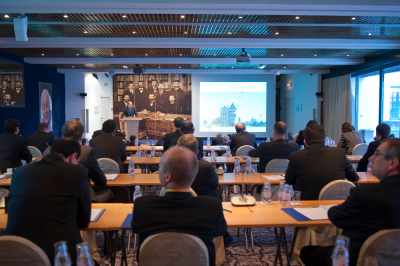Friday, April 29 2022

Breakfast
Partner Workshop
The political economy of international humanitarianism: a threat or an opportunity?
Referent – Pierre Micheletti, Action contre la Faim – France, President
The current economic model of international humanitarian aid raises the question of whether the scope of humanitarian action can be maintained.
The prevailing situation endangers this scope of action from two perspectives:
- It makes it impossible to raise the necessary funds and thus exposes organizations to a risk of operational paralysis due to a lack of financial resources.
- It “politicizes” humanitarian action by concentrating revenues in the hands of an exclusive club of some twenty States, who earmark 83% of their receipts to the crises that they have prioritized. As a result, this fact gives rise to a feeling among parties engaged in conflicts that donor States wield a type of humanitarian “soft power” and/or collude with the governments of countries facing civil conflicts. This has implications for the safety of our humanitarian personnel, particularly while they are placed under pressure when screening beneficiaries.
Speakers:
- Bertrand BADIE, professor emeritus, Sciences Po Paris
- Bertrand BREQUEVILLE, Médecins du monde
- Katie SAMS, Director of financial resources and logistics, ICRC
- Anne-Lise SIRVAIN, Director of Fundraising, MSF – F
Key Speaker :
- Maria GROENEWALD, Voice, Director
Illimitations of accountability requirements for humanitarian NGOs
Referent: Thierry Mauricet, Première Urgence Internationale
Given the Grand Bargain commitments and their current status, accountability toward beneficiaries is not the real issue on the table, but rather the “undesirable” effects of accountability that arise when aid programmes are extended to beneficiaries. The issue at hand has to do with donors demanding full compliance with administrative policies.
Three points lie at the heart of these issues and present concerns:
- The negative impact on the effectiveness of aid (Is the bureaucracy of humanitarian action detrimental to beneficiaries? / Are the costs of surveillance disproportionate? / The growing number of “bullshit jobs” – the management of compliance issues).
- Audits occurring after the fact (Financial and legal insecurity, the preponderance of audit firms / Unchecked surveillance / Respect for GDPR).
- AML/CFT regulations (Security paranoia? / Fear of sanctions? / Reduced scope of humanitarian action?).
Speakers:
- Ludovic DONNADIEU, Founding Partner, Director General, Donnadieu et associés
- Hassan EL SAYED, Director, Redevabilité et Développement des Partenariats, Solidarités International,
- European Parliamentarian
How can humanitarians take collective action in the wake of climate change?
Referents: Karine Meaux – Fondation de France, Virginie Troit – Fondation de la Croix-Rouge française
For decades, those involved in humanitarian action, development, human rights and environmental protection have worked in isolation from each other. On the other hand, the growing threat of climate change and the harsh realities of crises are bringing them closer together and motivating them to find a common discourse and shared energies. Still, they must speak the same language, embrace a common advocacy approach, and agree on standards and practices that require a consensus to be effective. Three recent examples illustrate these dynamics: the launch of the first Charter on Climate and Environment for Humanitarian Organisations by the International Red Cross and Red Crescent Movement, and the Declaration of Commitment of Humanitarian Organisations on Climate in 2021, and the Declaration of Commitment of Donors presented at the European Humanitarian Forum in 2022.
How can French and international humanitarian actors organise themselves to collectively take up such a challenge? Do group dynamics impede or facilitate the fight against climate change and the adoption of necessary adaptive measures?
Intervenants:
- Alexandre MOREL, Care France / Annie Evrard, CDCS
- Tiziana BONZON, Manager Climate, Migrations and resilience, IFRC
- Ignacio PACKER, ICVA, Directeur exécutif
- Carola KLOECK, Sciences Po
Grands Témoins:
- Rafael Luis Ruiz de Castaneda, Faculty of Medicine, University of Geneva
- Representative Groupe URD – Réseau environnement/humanitaire
Group photo and coffee-break
Espace Rendez-vous
Free time for personal work or individual or group meetings on the humanitarian themes presented by the participants.
Humanitarian Alternatives review: Appraisal and development
Salle à définir
Jean-Baptiste Richardier, co-founder and member of the Board of Directors
Breakfast
Restitution des ateliers et débat
Salle Charles Mérieux
Échanges et partage en plénière autour des thèmes principaux se dégageant des Ateliers du matin. La restitution des trois ateliers sera filmée et mise en ligne sur le site du FEH. Nous invitons l’ensemble des participants à visionner ces trois vidéos de restitution en préparation de cette session de débats.
Modération
- Audrey Sala, Coordination et communication, Alternatives Humanitaires
Update and perspectives of major prolonged armed conflicts: What are the operational responses?
Salle Charles Mérieux
This session will cover the Ukraine, the Tigray and Yemen conflicts, the situation in Armenia/Azerbaijan, and will open discussions on possible contingency measures to be taken (such as pre-positioning, etc.) in connection with the risk of war in the Indo-Pacific region.
Key Speakers :
- Laurent Bonnefoy, Head of Research, CNRS, specialist of YEMEN.
- Eloi FICQUET, Lecturer at EHESS, specialist of Ethiopia
- Robert MARDINI, Director General, ICRC
- MSF Representative
Modération:
- Julie GACON, France Culture, Journaliste
Référent:
- Philippe RYFMAN
*There will be a 15-minute coffee break around 5pm
Festive and convivial evening event at Chez Ingalls (Annecy)
A shuttle will return to Les Pensières at 00:30, with a stop at the Hotel Les Muses.
